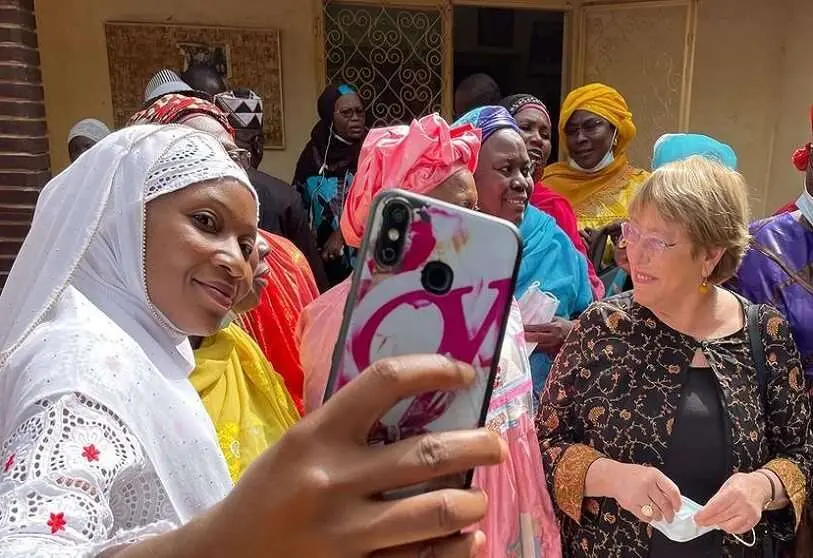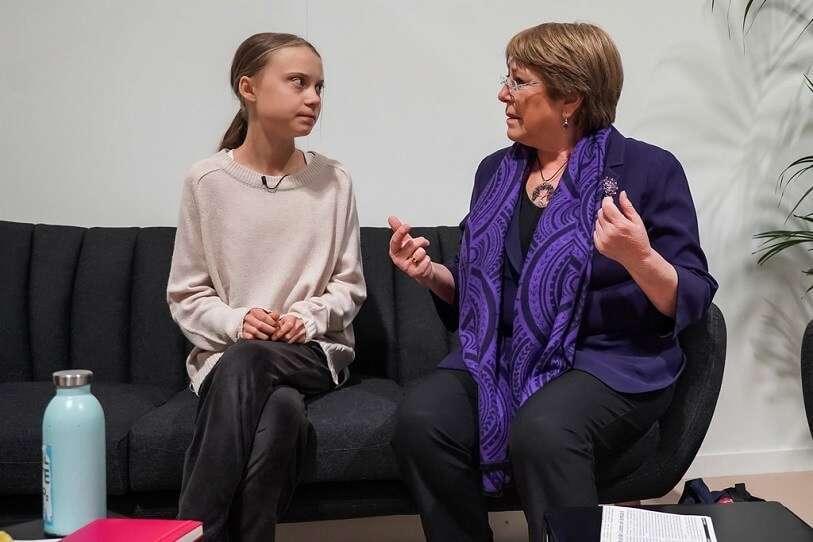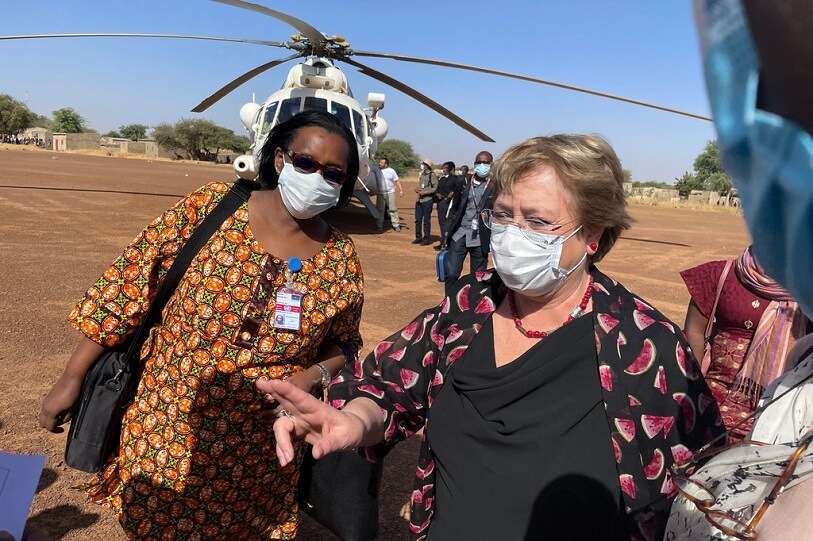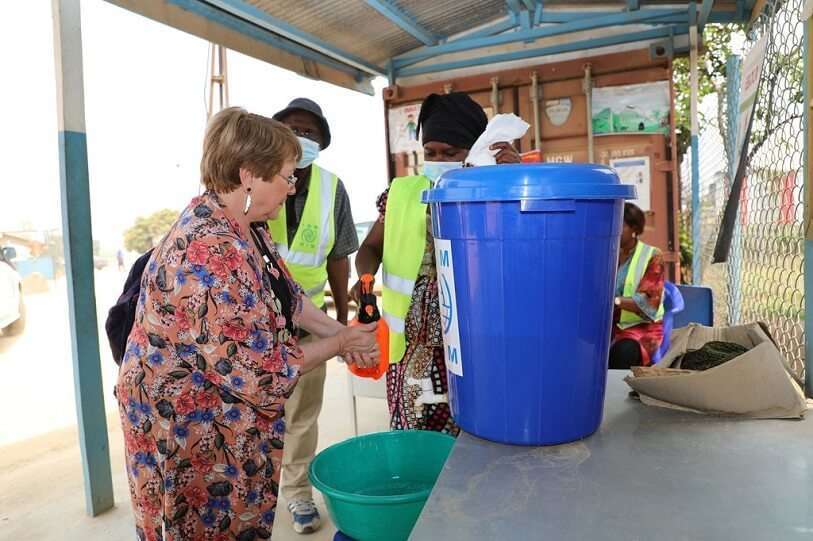Bachelet: always be open to dialogue

Michelle Bachelet ended her term as High Commissioner for Human Rights on Wednesday 31 August. Before leaving, she spoke in depth with UN News about her experience at the helm over the past four years.
UN News: When you came to this post, you already warned that the task of ensuring human rights is never ending. Now that you are leaving, what have you achieved and what has been left unresolved?
Michelle Bachelet: This is a task that never ends because, although there is a lot of progress, there can be temptations to not always protect human rights and, therefore, there is still a lot to do and probably a lot that we don't manage to finish. But that's the way it is, that's the task. It's like a relay race, where one passes the baton to the other. In general in the United Nations it is always like that, one builds on what the other has already built.
However, that being true, there are things that were achieved and I believe that one important thing is the agreement that the right to a clean, sustainable environment is a human right. This was something promoted by civil society, then pushed strongly by the office of the High Commissioner with the World Health Organisation, and then there was an agreement in the Human Rights Council, which was taken to the General Assembly, which recently approved this by a large majority.
This is tremendous news, because that means that if States make and carry forward the resolution to which they have committed, it is going to mean that, together with the Paris Agreement, we take more decisive action to address this issue, which is going to be the most serious crisis for humanity.

UN News: In these four years, human rights have gone through tough trials, from pandemics we had no memory of to new and unexpected wars, to cuts in women's rights in different countries and democratic governments that have had to face authoritarian attempts. Do you think we are in a time of involution?
Michelle Bachelet: We are in an era in which (...) it has been demonstrated that certain concepts that we thought were incorporated into the world's DNA are not.
And that means that in some cases there have been strong attempts to roll back women's rights, to not recognise the rights of sexual diversity, to restrict civil and political space; for example, some governments have used the pandemic (...) to restrict freedom of the press, freedom of expression, or bills have also been introduced to supposedly attack terrorism, although in the end they allow political dissidence to be curtailed.
But, at the same time, we have also seen young people marching and protesting climate change; women marching against sexual harassment and violence against women; many people, not only people of African descent, marching against racism and taking very important steps in this regard.
So it is true, in some areas there has been a setback or it has been more difficult to move forward, but in others there has been progress. That is why I always say, and I use a phrase from Archbishop Desmond Tutu, that I am a prisoner of hope, because I believe that one cannot give up.
I also think it is important to recognise those countries that have made important contributions (to the struggle for human rights). For example, today 170 countries in the world have abolished the death penalty or have put a moratorium on it, i.e. they are not carrying it out, and there are several others that have announced that they are going to abolish it. This, compared to what we had in the past, is a strong momentum.
And I also believe that there is more awareness of systemic racism and the need to address it with new laws, new policies, with education that allows us to deal with these burdens, with this legacy of colonialism that still weighs on us.
UN News: What have been the hardest personal moments of your mandate?
Michelle Bachelet: Different moments. Many times when one has to deal with a specific case, when one travels to the field and talks to people....
For example, I was recently in Cox Bazar, in Bangladesh, talking to refugees who told us: you can help us to be repatriated, because we want to go back. We feel that here we are a lost generation, and there we want to go back to contribute to society. The hard part is that we have nothing to offer them, because Myanmar today is in a situation where we cannot guarantee that return. And that could be multiplied by many visits to different places.
On the other hand, also what affected us all, even within the Office, was the COVID-19 pandemic, because we had to learn to adapt our way of working, the relationship with the family, the lack of socialisation; and also having to face the effects, not only the risk, because many lost loved ones.
And also to see how the inequalities in the world were expressed in terms of how to respond to such a serious pandemic, especially at the beginning (...), the fact that there was a lack of access to the vaccine, the fact that rich countries have access and other countries do not. That generated a lot of frustration, a lot of pain....
But at the same time, (there was) a lot of creativity and we began to generate a series of guides to orient countries on how to respond and confront the different issues related to COVID.
In other words, there are always hard times, but in the end - and I know that this is a much-used and hackneyed phrase, but it is true - crises also open up opportunities, and we learned a series of things that I believe will also be useful for the future.

UN News: And in our region, in Latin America, what is the human rights situation at the moment?
Michelle Bachelet: Latin America has not been exempt from what I mentioned (...) It is a region that, even before COVID, was already upset, it was not happy with the systems, neither political nor economic.
But then COVID came along and all the progress that had been made in Latin America took a big step backwards: poverty and unemployment increased, and the informal economy was exposed.
All of this has meant, in the end, the inability to ensure adequate social and economic rights for the people....
Moreover, in some places (COVID-19) was also used as an excuse to diminish civil and political rights, and also to harass journalists and human rights defenders. And in many parts too, when there was a strong reaction from the population, unfortunately instead of dialogue with them, some governments used excessive force, also violating political and civil rights.
Now I am concerned about what lies ahead, because the region is experiencing the effects (of the Ukrainian war). Many countries are high importers of grain, fuel, energy sources, fertiliser and other foodstuffs. And the war has meant a rise in inflation in most countries, so the same salary has a lower purchasing power.
Therefore, I would say that what I expect for the region is that unless governments do what they have to do, which is to establish social protection schemes to support the most vulnerable, (...) we are going to have a climate of social and political instability in a region that is going to have some elections this year.

UN News: Did your predecessor, Zeid Ra'ad al-Hussein, say at the end of his mandate that he would rather have been wrong for speaking out than for remaining silent? Have you had to remain silent many times or have you been free to say everything?
Michelle Bachelet: There is no single answer to the different human rights problems in the world. There are human rights problems in developed countries and there are other human rights problems in underdeveloped countries. And there are different types and severity of situations. Therefore, it is true that one has to speak out and speak loudly many times. But it is also true that every time you want to ensure that human rights are respected, you have to analyse what works best. Because it's really easy to talk and talk loudly and get applause from all sides, but sometimes that doesn't do any good. Other times you have to speak out in all sorts of ways, even if there is no result, because it is indispensable, or because you want to prevent someone from being executed, or because you want to let people in Myanmar, for example, know that they have not been abandoned, or in Afghanistan, that women know that they have not been abandoned by the international community. So, even if you know that saying certain things is not going to have any result, you do it. But sometimes there are other strategies that may be better.
I think what is smart is to do what is right, what is right, but also what is smart is what can work.
And I have never felt pressured to keep quiet. What I have always decided is that I can decide what I think should or should not be said, and in that I have also had the freedom.
UN News: Any advice or recommendations for your successor?
Michelle Bachelet: This is an extremely complex area, where there is no typical response to so many different situations. Of course, there is a framework of principles and values that is the same, but there are situations and situations. Not all countries have the same problems, not all countries have the same tradition or the same political capacity. And, therefore, I believe that one of my recommendations is that we must always be open to dialogue, to involve all the important actors, be they governments, civil society, the private sector, academia, universities, in order to face challenges that are very, very complex, many of which are also interrelated.
I hope to have the opportunity to talk to my successor and tell him or her about the experiences that sometimes one does not know before arriving here, the lessons learned, and also to give them my phone number in case they have any needs.








